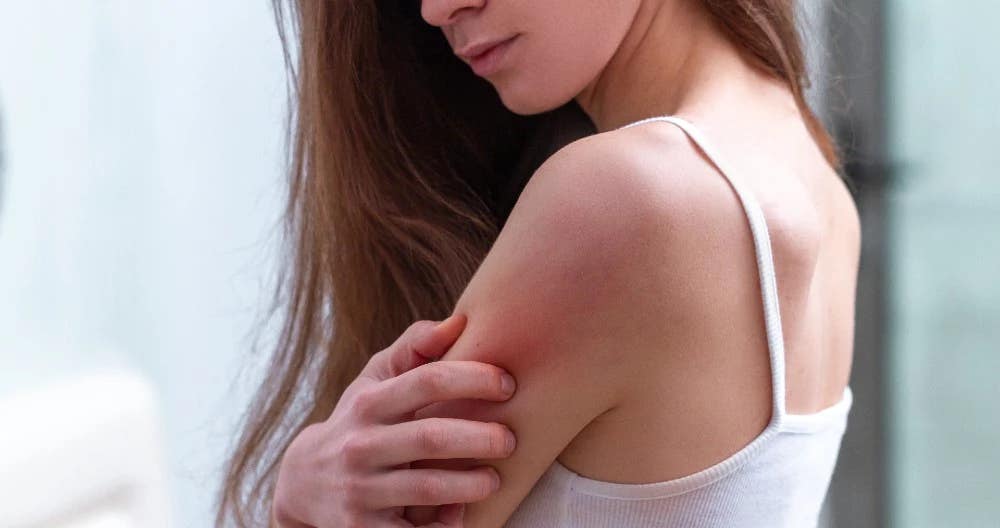New study reveals why you shouldn’t scratch an itchy rash
Scratching an itch worsens inflammation but also helps fight infections. Scientists uncover the complex role of scratching in skin conditions.

Scratching worsens inflammation while also helping to defend against bacterial infections. (CREDIT: CC BY-SA 4.0)
An itchy rash can be frustrating, and scratching often feels like the only relief. However, new research confirms that giving in to the urge only makes inflammation worse. The study, published in Science, uncovers how scratching intensifies swelling in allergic contact dermatitis, a common type of eczema.
Scratching is a deeply ingrained reflex, observed across many species. It helps remove irritants from the skin, but in conditions like eczema, persistent itching worsens symptoms. Unlike pain, which triggers avoidance, scratching can feel pleasurable. This paradox has puzzled scientists for years.
The latest findings reveal that scratching sets off a chain reaction in the immune system. When skin is scratched, pain-sensing neurons release a chemical called substance P. This molecule activates mast cells—immune cells that play a key role in allergic reactions.
Once activated, mast cells trigger the release of histamines, intensifying inflammation. The study also suggests that scratching, despite its harmful effects, provides some benefit: it helps protect against bacterial infections.
Dr. Daniel Kaplan, senior author of the study and professor of dermatology and immunology at the University of Pittsburgh, highlights the dual nature of this response. “At first, these findings seemed to introduce a paradox: If scratching an itch is bad for us, why does it feel so good?” he said. “Scratching is often pleasurable, which suggests that, in order to have evolved, this behavior must provide some kind of benefit. Our study helps resolve this paradox by providing evidence that scratching also provides defense against bacterial skin infections.”
How Scratching Triggers Inflammation
To understand why scratching worsens skin inflammation, researchers at the University of Pittsburgh induced eczema-like symptoms in mice. They compared normal mice with those lacking an itch-sensing neuron. In normal mice, scratching led to swelling and an influx of immune cells called neutrophils. These cells are key players in inflammation and infection defense.
However, when mice were prevented from scratching—either by lacking the itch-sensing neuron or by wearing tiny collars that blocked access to their skin—their inflammation was significantly reduced. The results confirmed that scratching is not just a reaction to irritation; it actively fuels skin inflammation.
Related Stories
Further experiments showed that scratching activates pain-sensing neurons, which then release substance P. This chemical, in turn, stimulates mast cells. Normally, mast cells respond to allergens by triggering mild inflammation and itchiness. But when scratching enters the picture, mast cells become hyperactivated through a second pathway. This dual activation significantly amplifies inflammation, worsening conditions like dermatitis.
“In contact dermatitis, mast cells are directly activated by allergens, which drives minor inflammation and itchiness,” explained Kaplan. “In response to scratching, the release of substance P activates mast cells through a second pathway, so the reason that scratching triggers more inflammation in the skin is because mast cells have been synergistically activated through two pathways.”
The Role of Mast Cells and Nerve Signals
Mast cells are well known for their role in allergic reactions. They release histamines, which increase blood flow and attract immune cells to affected areas. This helps fight infections but also contributes to the redness and swelling seen in eczema and other skin conditions.
In the study, researchers demonstrated that substance P interacts with a receptor called MrgprB2 on mast cells. When this receptor is activated, mast cells release inflammatory compounds, leading to increased skin irritation. This explains why scratching feels relieving in the moment but worsens symptoms in the long run.
Mast cells also contribute to the immune system’s defense against bacterial infections. Researchers wondered if scratching-induced inflammation could impact the skin’s microbiome. To test this, they introduced Staphylococcus aureus—a bacterium responsible for many skin infections—onto the skin of mice.
Their findings revealed a surprising effect: scratching actually helped reduce bacterial presence. This suggests that, in some cases, scratching may serve as an evolutionary adaptation, helping the body fight off infections despite its inflammatory consequences.
“The finding that scratching improves defense against Staphylococcus aureus suggests that it could be beneficial in some contexts,” said Kaplan. “But the damage that scratching does to the skin probably outweighs this benefit when itching is chronic.”
Implications for Treatment
Understanding the link between scratching, inflammation, and bacterial defense could open new doors for treating skin conditions like eczema, rosacea, and urticaria. The research team is now exploring therapies that target mast cell receptors to reduce inflammation without compromising the skin’s immune defense.
Blocking specific pathways activated by scratching could prevent the cycle of inflammation while preserving the beneficial effects of immune responses. Scientists are particularly interested in drugs that target the receptors involved in mast cell activation, such as MrgprB2.
These insights also highlight the importance of managing itch before it triggers an inflammatory cascade. Current treatments, such as antihistamines and corticosteroids, focus on reducing inflammation, but new therapies could directly block the nerve signals responsible for itch-induced inflammation.
For now, dermatologists emphasize that managing eczema and other itchy skin conditions involves more than just avoiding scratching. Moisturizers, anti-inflammatory creams, and avoiding known allergens can help prevent flare-ups.
This study sheds light on a fundamental biological response that has long been misunderstood. While scratching may provide temporary relief and even some immune benefits, it ultimately fuels inflammation, making skin conditions worse.
By targeting the pathways that link scratching to inflammation, researchers hope to develop better treatments for millions who suffer from chronic skin disorders.
Note: Materials provided above by The Brighter Side of News. Content may be edited for style and length.
Like these kind of feel good stories? Get The Brighter Side of News' newsletter.
Rebecca Shavit
Science & Technology Journalist | Innovation Storyteller
Based in Los Angeles, Rebecca Shavit is a dedicated science and technology journalist who writes for The Brighter Side of News, an online publication committed to highlighting positive and transformative stories from around the world. With a passion for uncovering groundbreaking discoveries and innovations, she brings to light the scientific advancements shaping a better future. Her reporting spans a wide range of topics, from cutting-edge medical breakthroughs and artificial intelligence to green technology and space exploration. With a keen ability to translate complex concepts into engaging and accessible stories, she makes science and innovation relatable to a broad audience.



